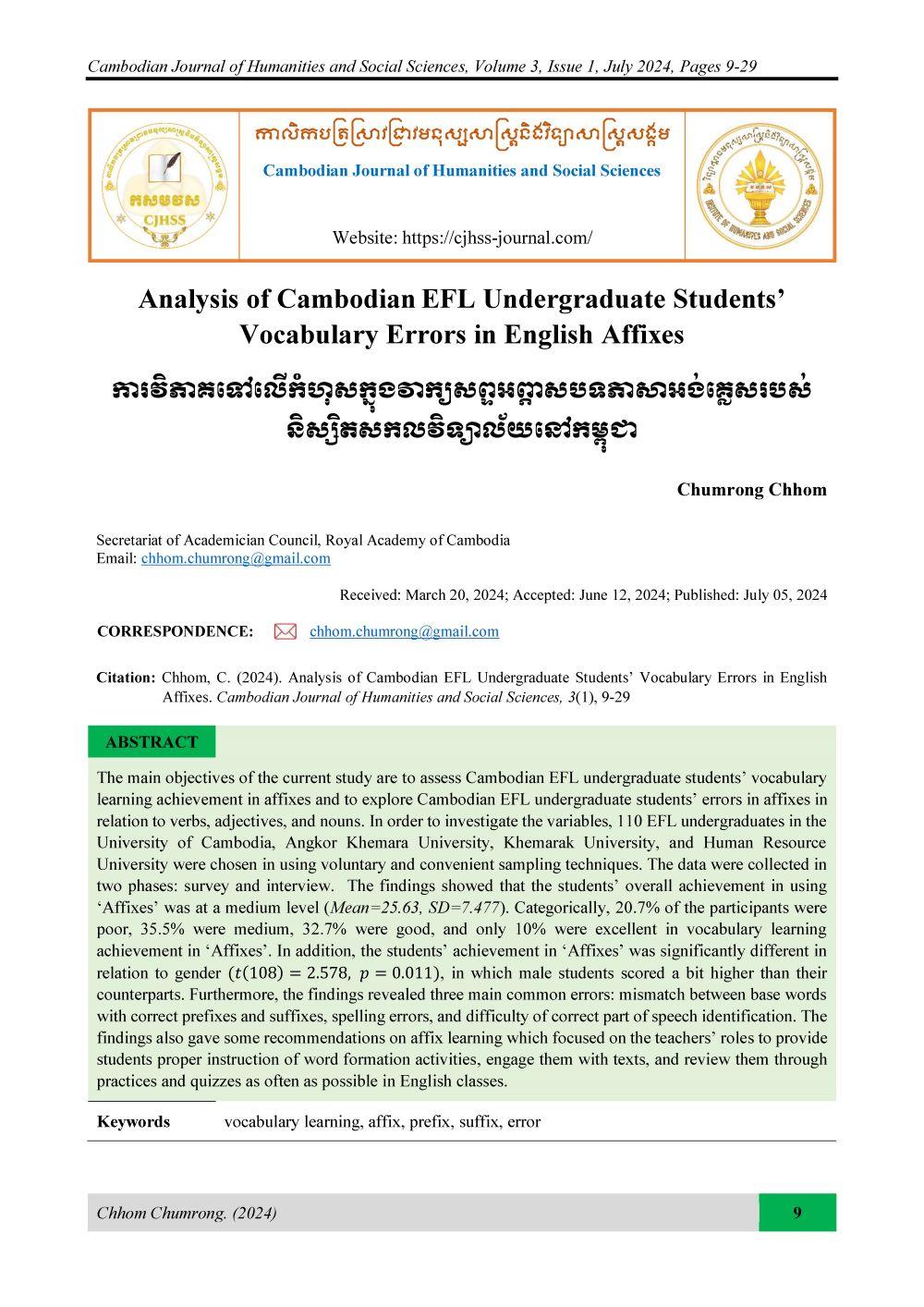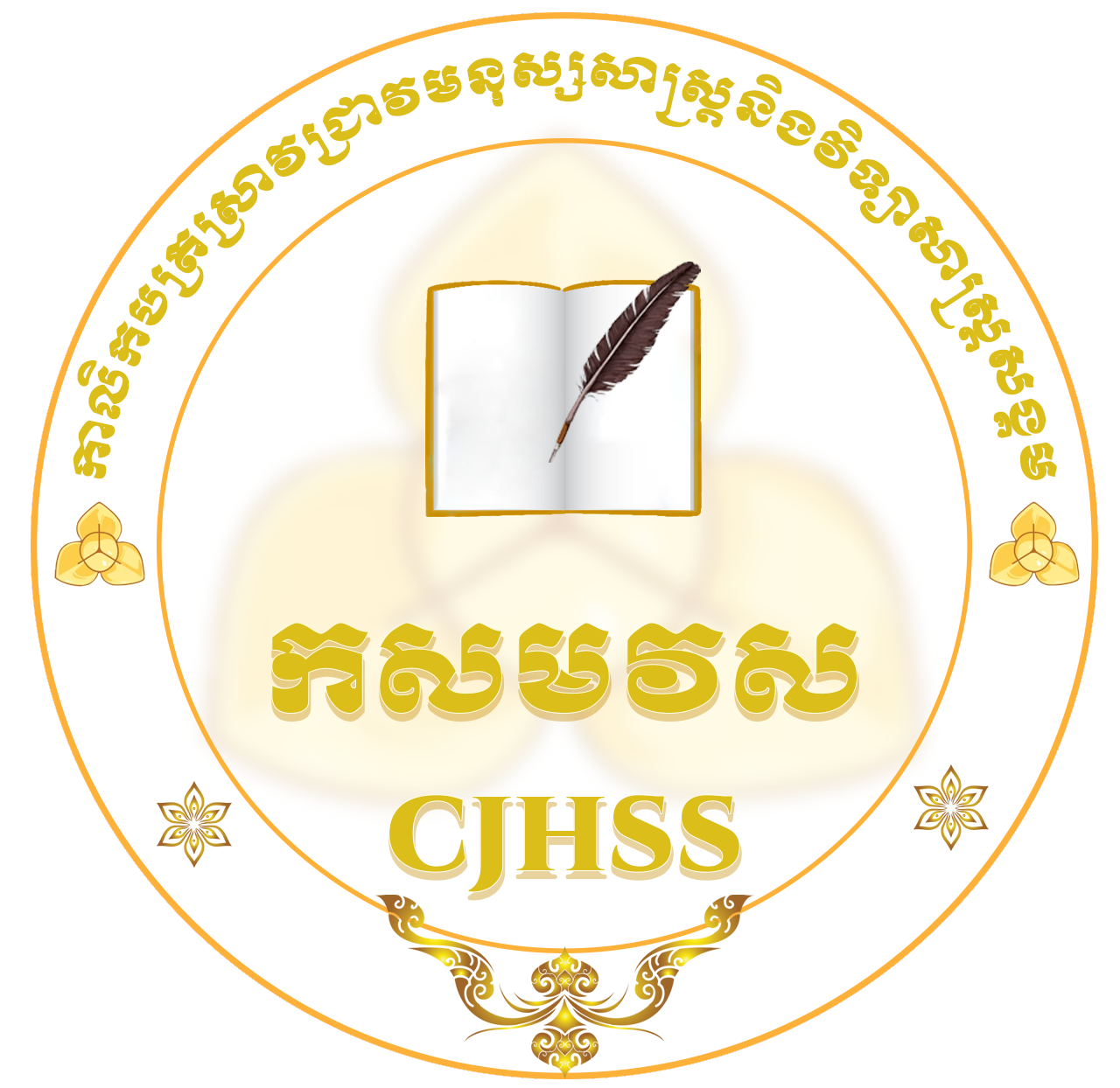Citation
Chhom, C. (2024). Analysis of Cambodian EFL Undergraduate Students’ Vocabulary Errors in English Affixes. Cambodian Journal of Humanities and Social Sciences, 3(1), 9-29
អាគតដ្ឋាន
Chhom, C. (2024). Analysis of Cambodian EFL Undergraduate Students’ Vocabulary Errors in English Affixes. Cambodian Journal of Humanities and Social Sciences, 3(1), 9-29
Abstract
The main objectives of the current study are to assess Cambodian EFL undergraduate students’ vocabulary learning achievement in affixes and to explore Cambodian EFL undergraduate students’ errors in affixes in relation to verbs, adjectives, and nouns. In order to investigate the variables, 110 EFL undergraduates in the University of Cambodia, Angkor Khemara University, Khemarak University, and Human Resource University were chosen in using voluntary and convenient sampling techniques. The data were collected in two phases: survey and interview. The findings showed that the students’ overall achievement in using ‘Affixes’ was at a medium level (Mean=25.63, SD=7.477). Categorically, 20.7% of the participants were poor, 35.5% were medium, 32.7% were good, and only 10% were excellent in vocabulary learning achievement in ‘Affixes’. In addition, the students’ achievement in ‘Affixes’ was significantly different in relation to gender (t(108)=2.578,p=0.011), in which male students scored a bit higher than their counterparts. Furthermore, the findings revealed three main common errors: mismatch between base words with correct prefixes and suffixes, spelling errors, and difficulty of correct part of speech identification. The findings also gave some recommendations on affix learning which focused on the teachers’ roles to provide students proper instruction of word formation activities, engage them with texts, and review them through practices and quizzes as often as possible in English classes.
សង្ខិតន័យ
គោលបំណងសំខាន់នៃការស្រាវជ្រាវនេះគឺវាយតម្លៃលទ្ធផលនៃការរៀនវាក្យសព្ទអព្ភាសបទភាសាអង់គ្លេសរបស់និស្សិតខ្មែរថ្នាក់បរិញ្ញាបត្រនិងស្វែងយល់ពីកំហុសក្នុងការប្រើប្រាស់អព្ភាសបទរបស់និស្សិតទាក់ទងនឹងកិរិយាស័ព្ទ គុណនាម និងកិរិយាស័ព្ទ។ និស្សិតថ្នាក់បរិញ្ញាបត្រជំនាញភាសាអង់គ្លេសចំនួន១១០នាក់ ដែលកំពុងសិក្សានៅសាកលវិទ្យាល័យកម្ពុជា សាកលវិទ្យាល័យអង្គរខេមរា សាកលវិទ្យាល័យខេមរៈ និង សាកលវិទ្យាល័យធនធានមនុស្ស ត្រូវបានជ្រើសរើសឱ្យចូលរួមក្នុងការសិក្សាតាមវិធីជ្រើសរើសដោយការស្ម័គ្រចិត្តនិងការជ្រើសរើសសំណាកងាយៗ។ ទិន្នន័យត្រូវបានប្រមូលតាមពីរដំណាក់កាល៖ ការស្ទង់មតិនិងការសម្ភាស។ លទ្ធផលនៃការស្រាវជ្រាវបានបង្ហាញថា លទ្ធផលនៃការរៀនវាក្យស័ព្ទអព្ភាសបទភាសាអង់គ្លេសរបស់និស្សិតស្ថិតក្នុងកម្រិតមធ្យម (Mean=25.63, SD=7.477)។ ក្នុងនោះដែរ 20.7% នៃនិស្សិតទាំងនេះមានសមត្ថភាពទាក់ទងនឹងវាក្យសព្ទកម្រិតខ្សោយខ្លាំង, 35.5% ទទួលបានមានលទ្ធផលកម្រិតមធ្យម, 32.7% ទទួលបានលទ្ធផលល្អគួរសម និងមាននិស្សិតតែ10% ប៉ុណ្ណោះដែលមានលទ្ធផលនៃការរៀនកម្រិតល្អខ្លាំងលើអព្ភាសបទភាសាអង់គ្លេស។ បន្ថែមពីនេះ លទ្ធផលស្រាវជ្រាវក៏បានបង្ហាញថានិស្សិតប្រុសរៀនបានប្រសើរជាងនិស្សិតស្រី។ លទ្ធផលអំពីការវិភាគទៅកំហុសទូទៅក្នុងការរៀនអព្ភាសបទភាសាអង់គ្លេសបានបង្ហាញនូវទិដ្ឋភាពចំនួនបី៖ កំហុសក្នុងការកំណត់បុព្វបទនិងបច្ច័យឱ្យស៊ីគ្នាជាមួយពាក្យដើម កំហុសអក្ខរាវិរុទ្ធ និង កំហុសក្នុងការកំណត់ថ្នាក់ពាក្យឱ្យបានត្រឹមត្រូវ។ តាមរយៈលទ្ធផលនេះ ការសិក្សាបានផ្តល់នូវអនុសាសន៍មួយចំនួនលើការសិក្សាអព្ភាសបទក្នុងភាសាអង់គ្លេស ដោយផ្តោតលើតួនាទីរបស់គ្រូបង្រៀនក្នុងការបង្ហាញនិស្សិតពីការបង្កើតពាក្យ ការបញ្ចូលអព្ភាសបទក្នុងអត្ថបទ និង ការរំឮកឡើងវិញតាមរយៈការអនុវត្តនិងការធ្វើតេស្តឱ្យបានញឹកញាប់តាមអាចធ្វើទៅបាននៅក្នុងម៉ោងសិក្សា។


